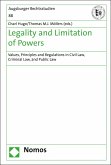Focusing on South Africa during the period 1650-2000, this book examines the role of law in making democracy work in changing societies. The Legacies of Law sheds light on the neglected relationship between path dependence and the law. Meierhenrich argues that legal norms and institutions, even illiberal ones, have an important - and hitherto undertheorized - structuring effect on democratic outcomes. Under certain conditions, law appears to reduce uncertainty in democratization by invoking common cultural backgrounds and experiences. In instances where interacting adversaries share qua law reasonably convergent mental models, transitions from authoritarian rule are shown to be less intractable. Meierhenrich's historical analysis of the evolution of law - and its effects - in South Africa during the period 1650-2000, compared with a short study of Chile from 1830-1990, shows how, and when, legal norms and institutions serve as historical causes to both liberal and illiberal rule.
Dieser Download kann aus rechtlichen Gründen nur mit Rechnungsadresse in A, B, BG, CY, CZ, D, DK, EW, E, FIN, F, GR, HR, H, IRL, I, LT, L, LR, M, NL, PL, P, R, S, SLO, SK ausgeliefert werden.









